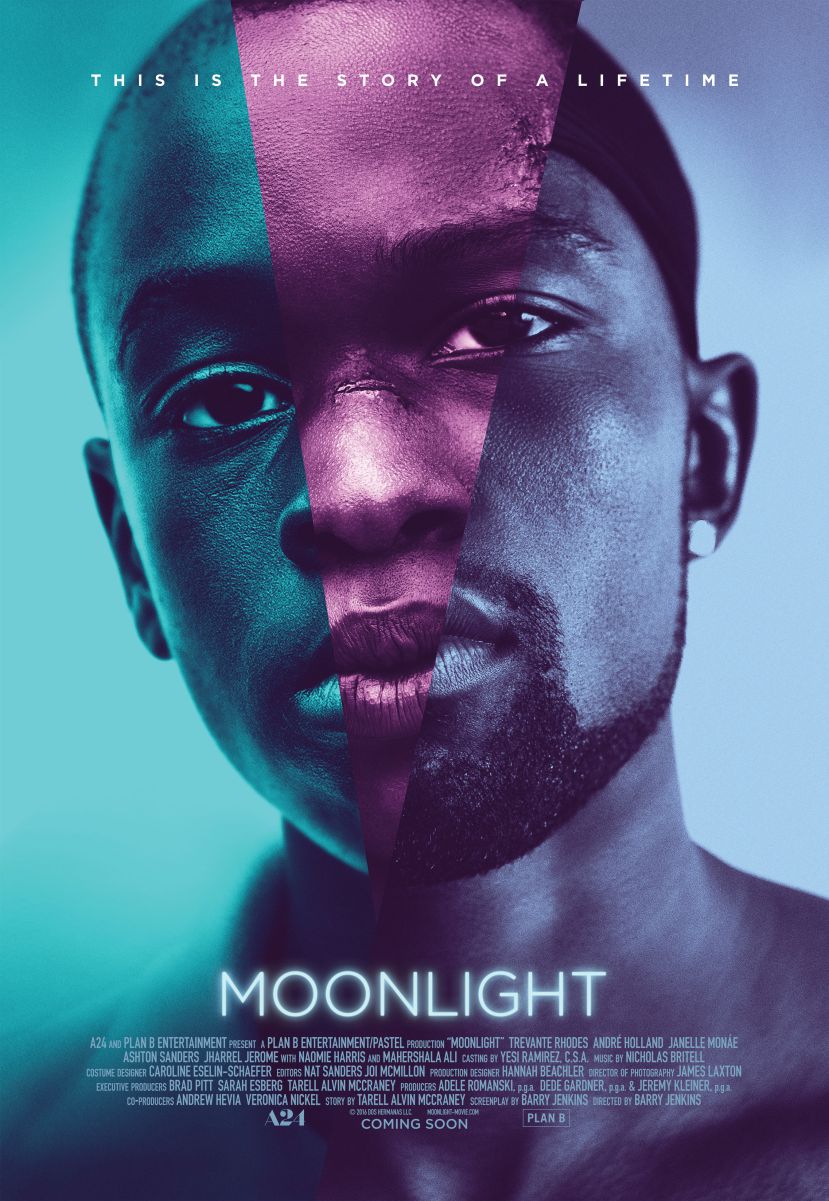More often than not it seems movies try to throw everything possible at audiences in an effort to entertain, whether it’s big stars, big effects, overly-intricate plots, whiz-bang animation, sight gags, or the always-maudlin tear-jerking moments.
But each year there are also a small handful of movies that just keep it simple, telling a quiet story about people. Last month saw the honest and heartfelt Loving, and now writer/director Barry Jenkins keeps it going with the wonderfully understated Moonlight. With little to no star power, not a single explosion, and nary a special effect, it relies solely on dialogue and performances (and Jenkins’ own outstanding direction) to tell its story, and it does so flawlessly.
Presented as a three-part tale, based on the play by Tarell Alvin McCraney, Moonlight revolves around Chiron, a young black man in Miami. Part one opens with him as an elementary-school kid, teasingly nicknamed “Little” by his classmates and being chased by bullies after school. Little (Alex Hibbert) escapes to an abandoned crack den, where he is soon discovered by local dealer Juan (Mahershala Ali). Little instantly latches onto Juan and his girlfriend Teresa (Janelle Monae), foregoing the unsettled life he’s used to, being raised by his drug addict mother Paula (Naomie Harris). Juan and Teresa take in Little willingly, giving him not only food and shelter but and the love that the boy clearly isn’t receiving at home. Little, though, isn’t immune to his surroundings—he’s fully aware of his mom’s demons, and when he puts two and two together and realizes how Juan’s profession ties in, we’re witness to one of the film’s most heartbreaking moments.
The second part progresses to Chiron’s teenage years, as he navigates high school. Aston Sanders takes over the role, and his quiet expressiveness further elevates the film. Dealing not only with the ongoing bullying and his mother’s worsening addiction, Chiron is also now confronting the fact that he’s a young, black, gay man in the hood. Though he finds a kindred spirit in Kevin (Jharrel Jerome), their friendship and mutual understanding isn’t enough to overcome the inherent prejudices.
Moonlight wraps up with a grown Chiron (Trevante Rhodes) continuing his personal struggles in Atlanta. When he gets an out-of-the-blue phone call from Kevin (André Holland), it rekindles thoughts and emotions Chiron (now going by his street name “Black”) had clearly left behind. The two meet up, and Moonlight spends the better part of twenty minutes presenting the pair in nothing but an honest conversation. It’s an absolutely refreshing, entirely pure moment, instantly reminding us of the power of phenomenal acting when paired with a fearless script.
Further powering the film is the brilliant score by Nicholas Britell. A pseudo-classical tour de force, it gives Moonlight its identity, always bubbling just underneath without getting in the way. And Jenkins supplements it with as eclectic a mix of music as you could find, including a choral piece by Mozart, a 1963 doo-wop hit, and a hard-hitting hip-hop track by Goodie Mob.
Jenkins filmed Moonlight in an almost documentary style, giving us a first-person look at Chiron’s world, both through his eyes and those of the people around him. We watch over his shoulder as he walks down the street, stare directly into his mother’s eyes as she yells at him, and become otherwise completely immersed in his world. When Juan teaches Little how to swim, we’re splashing alongside in the choppy ocean. When Black sees Kevin for the first time in a decade, we see what he sees. It’s a masterful move by Jenkins giving Moonlight both an immediacy and a tenderness not often seen on film.
The film is the epitome of people-driven storytelling and a true masterpiece. It looks as though it took no effort at all to produce, but that’s its genius.
Rating
5/5 stars
